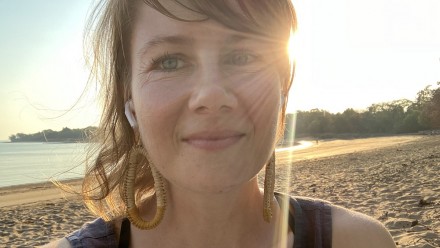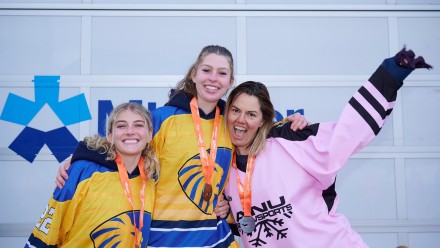A curious mind and a grandfather’s battle inspire a need to understand neurology
 Maddison Brian (r) receiving her award from Olivia Nassaris (l) on World Parkinson's Day
Maddison Brian (r) receiving her award from Olivia Nassaris (l) on World Parkinson's Day
 Tornike Janjgava (r) receiving his award from Olivia Nassaris (l) during World Parkinson's Day event
Tornike Janjgava (r) receiving his award from Olivia Nassaris (l) during World Parkinson's Day event

Ms Maddison Brian’s fascination for neuroscience started when she was a teenager.
“I would take every opportunity to read about the wonders and miracles of the human brain,” she enthused.
Her interest grew when she undertook a neuroscience major during her Bachelor of Science degree, and after graduation while working her first job at a hospital.
“I worked as a Sleep Scientist and found it interesting that some of the first manifestations of neurological disorders are related to sleep. Sleep disorders are very common in Parkinson’s disease, especially REM behaviour disorders,” Ms Brian advised.
Her passion came into focus when she completed a Master of Biomedical Science.
“Through the Masters process I realised I wanted to do work where I could see how research is translated into improving people’s lives in tangible ways, and that’s how I ended up at medical school,” Ms Brian said.
Similarly, her Doctor of Medicine and Surgery colleague, Mr Tornike Janjgava developed his interest in the brain and nervous system when he studied neurophysiology and neuropsychology during his undergraduate degree. His passion deepened as he learned about the work of researchers who focused on the brain.
But perhaps the most important influence for Mr Janjgava and his interest in neurology, and more specifically Parkinson’s disease, came about because of his grandfather.
“The year before I started my medical degree my grandfather passed away. He had Alzheimer’s disease. We were very close and it was difficult watching the neurodegenerative process rob him of everything,” Mr Janjgava said.
“Watching his decline brought a clear insight into how neurodegenerative disorders can be some of the most insidious by nature. As a result, it has inspired me to pursue learning in the area of neurology and has sharpened my focus to consider neurology as a part of my career plan,” noted Mr Janjgava.
With a deep desire to learn more, both students completed a neurology elective at the Canberra Hospital under the supervision of Professor Christian Lueck, Dr Andrew Hughes and Dr Chandi Das.
“We got to spend time in the wards seeing patients with acute neurological conditions who required immediate medical care. We also spent time in outpatient clinics and this is where we got a chance to meet with patients with Parkinson’s Disease and learned how they managed in their day-to-day lives,” Ms Brian advised.
“We were very impressed with the knowledge of the doctors and their understanding of the brain. Very subtle physical examination signs can indicate presence of a neurological disorder. I really enjoyed our supervisor’s explanations of certain signs and how it can lead to a diagnosis.”
Their experience during the elective placement was further supported by a Parkinson’s ACT George Webb Memorial Prize for each student.
Mr Janjgava said, “Being a medical student is often challenging because of the high workload and the need to maintain an income. The prize allowed us both to immerse ourselves in the neurology elective throughout the four weeks without concern about finances. It also allowed me to purchase a neurology textbook and some equipment needed for the neurological examination.”
Ms Brian and Mr Janjgava are thankful to Parkinson’s ACT for their support during the elective and recently attended the World Parkinson’s Day event hosted by Parkinson’s ACT to receive their award certificates.













